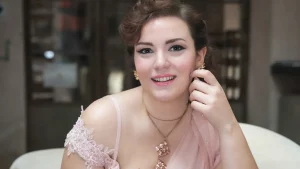
Q & A: Teresa Iervolino on Singing Rossini & Donizetti at the Bayerische Staatsoper
By Francisco SalazarIn September, mezzo-soprano Teresa Iervolino got a call from the Bayerische Staatsoper to perform “La Cenerentola” on short notice. The mezzo, who was already scheduled to perform at the house later in the month immediately said yes and began her season earlier than expected.
A rising star in the opera world, Iervolino has already made her name performing Bel canto roles and baroque operas in many of the great opera houses in the world.
OperaWire spoke with Iervolino on performing the title role in “La Cenerentola” and making a quick transition from Rossini’s high flying coloratura to Donizetti’s lyric lines.
OperaWire: What does it feel like to sing at the Bayerische Staatsoper especially when it is unplanned?
Teresa Iervolino: It hasn’t been all that unplanned. I was already planned for this season for “Lucrezia Borgia,” but I’m so happy to be here sooner than expected and with a role that I love, Cenerentola.
It’s always so exciting to sing in this house like in every theater. Every time it’s like the first time and this is one of the best things about our work.
OW: What has your experience been singing in Munich, one of the greatest opera houses in the world?
TI: I sang many times in this great theater and it was love at first sight. The first time I didn’t think it was true, to sing in one of the greatest opera houses in the world.
I remember that was a wonderful and unforgettable experience. I had my debut with Maffio Orsini in “Lucrezia Borgia” with the divine Edita Gruberova. It was a dream that became real. This theater has great organization and great energy. I love them and I love its warm audience so much.
OW: Tell me about “La Cenerentola.” What do you most like about singing this role? How do you view the character and how has your interpretation evolved over the years?
TI: I love this young and humble girl. She wants to find freedom and happiness, but she doesn’t know the world. Over the years I have discovered more and more sides of this character. She is courageous and what matters to her is goodness. She does not care about wealth or aesthetic beauty.
She fights with peace and not with violence. To sing this role is always a journey in my soul because it is like returning to my childhood. It’s not easy.
OW: How does Angelina’s music differ from the rest of the Rossini music you sing?
TI: The music is different because the role is different. The particularity of Angelina is that she has many dark and melancholic moments with low vocal textures. When she shows her happiness at the end, she sings many High coloratura notes. This role has a so great vocal range and a mixture of legato and coloratura to express every emotion that she feels.
OW: What does it feel like to sing in such a legendary production like the one at Munich?
TI: It’s a great pleasure and honor to sing in this production and in this amazing house. I love this production, its sets, and costumes, I think it’s one of the best in history and in the world.
OW: You are also doing Lucrezia Borgia this month? Tell me about switching from Rossini to Donizetti?
TI: Yes, I’m singing Maffio Orsini in “Lucrezia Borgia” now. I haven’t found it so difficult to switch from Rossini to Donizetti. They are two different composers but both from the Bel Canto period. Sometimes Donizetti’s writing is more legato while Rossini’s is more coloratura singing. But many shades are similar and so close to my voice.
OW: What are the challenges of doing a pants role especially after doing “La Cenerentola?”
TI: It’s not a challenge for me but really fun. I love to be a different character every time and to do this switch in such a short time is so exciting. I love playing Pants roles because I think there is a male side and a female side in all of us and I love to bring this side of me to life.
OW: What does Bel canto mean to you?
TI: Bel Canto for me is a universal language. It is a language where music and words have the same value and importance. You can express indescribable feelings, emotions, and moods with Bel Canto. It also has everything. There is coloratura, big extensions, legato phrasings, and many shades. I love to be a part of this world and to express my emotions with it.
OW: What are some other upcoming productions you are looking forward to?
TI: One of my future projects is a new production of “Giulio Cesare” at the National Opera and Ballet of Amsterdam with stage director Calixto Bieito and musical direction by the great Emmanuelle Haïm. I am looking forward to working with them. Also, I will return to the Bayerische Staatsoper in March with “Calisto” by Cavalli. It is another production that I did at the Teatro Real de Madrid three years ago and I adore it.


